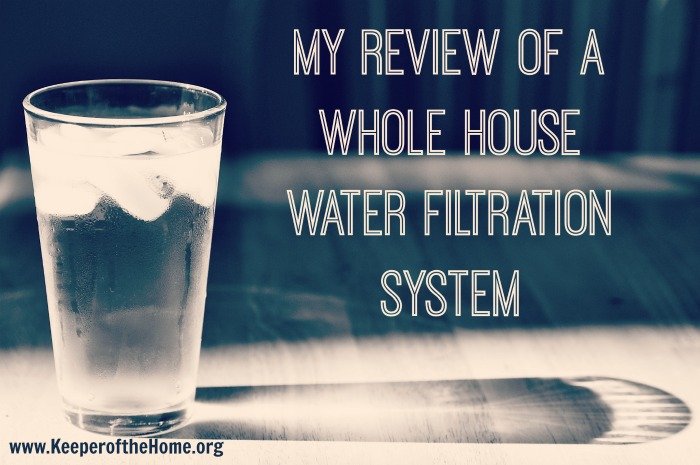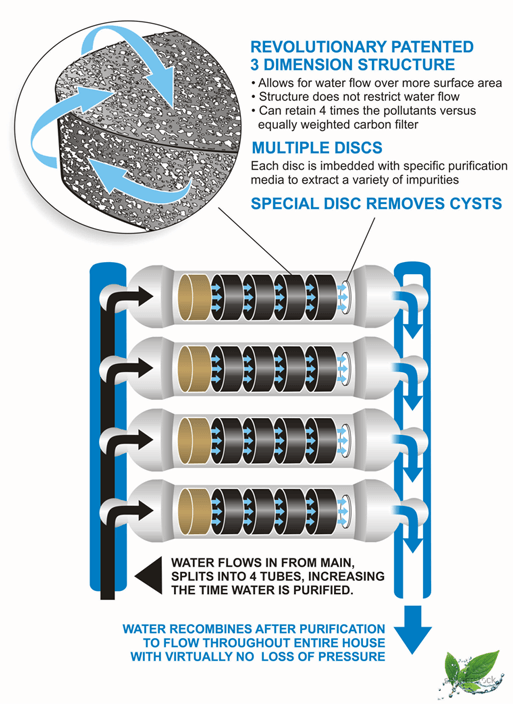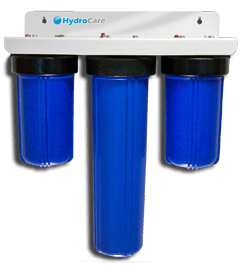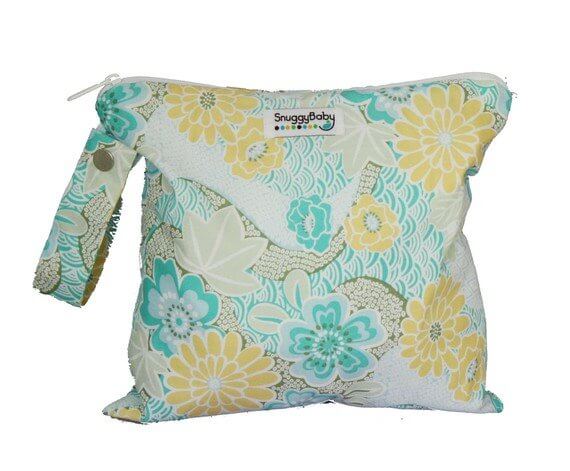My Review of a Whole House Water Filtration System

Clean drinking water is a murky subject.
I’ll confess that every time I begin to write a post about water filtration and removing toxins from your family’s water sources, I am tempted to start hyperventilating.
There’s so much out there. If you begin to search for answers to questions like “what are the primary contaminants in tap water?”, “what are the health concerns associated with chlorine exposure?”, “which pharmaceuticals have been found in tap water?” and “what kind of filters are most effective for removing ____ (fill in the blank with heavy metals, chlorine, pharmaceutical drugs, harmful bacteria, etc.), well, the results are overwhelming. And confusing. And contradictory.
I’m no scientist. When articles start telling me about synthetic organic chemicals (SOCs) vs. volatile organic chemicals (VOCs), and how coconut shell granulated activated carbon filters are the most effective technology, but oh wait… they don’t filter out inorganic chemicals, well, then my eyes begin to glaze over, and I wonder whether I should just write another smoothie recipe and forget about the water issue altogether.
So I want you to take my personal views and understanding on the issue of water safety and filtration and contamination with a big ol’ grain of kosher salt. The plain and simple truth is, I don’t know all the right answers. I’m a concerned wife and mom, who tries to keep herself well-researched and informed, with limited time, and a lack of sufficient education to understand everything I’m reading.
Here’s what I do know: Just because we don’t and can’t know everything, doesn’t mean we shouldn’t try.
We should try to understand as best as we can. We should try to make an informed decision about whether the health of our family may be compromised. We should try to take preventative actions when they seem justified and reasonable.
No one else is going to do these things for us. It is not up to the government, doctors, the EPA, the FDA, the local health authorities, or any other sort of governing or regulatory body. Really, it’s up to us.
That’s why a huge goal of this website is to bring information to help you along and point you to resources for further educating and equipping yourself in decisions that impact the health and well being of your family, the environment, and even ultimately impact people beyond our own front door.
As for me and my family, here are several reasons why we choose to invest in quality water purification for our home:
1. To protect against the unknown effects of chlorine and the dangerous chemical compounds that it creates when it comes in contact with various other materials (usually organic materials). It is my understanding that these include a group of byproducts known as trihalomethanes (THMs), including chloroform, as well as “chloramines” such as monochloramine, dichloramine, and trichloramine. Studies have shown that these compounds may be hazardous and related to reproductive toxicity, cancer, respiratory tract complications, skin irritations, among other things. Studies seem to be inconclusive and inadequate still at this point, but there does seem to be evidence indicating that there are negative effects, even if we (well, certainly I) don’t clearly understand how it all works. (1, 2, 3, 4)
2. To protect against possible heavy metals in our water. While we are naturally exposed to very minute amounts of most minerals and metals, some are more harmful than others when exposure goes above certain levels, especially metals like mercury, lead, arsenic, aluminum and cadmium (1).
3. To protect against the impact of pharmaceutical drugs and other toxic contaminants that commonly make their way into our water supplies, through sewage, through agriculture run-off, through landfill seepage, etc. Not all filtration systems adequately deal with these chemicals, as this is a newer concern that has only come to light in recent years and honestly, we don’t know enough yet about how to filter out these myriad chemicals, like synthetic hormones treatments, anti-depressants, tranquilizers, anti-epileptics, antibiotics, you name it. That said, if we can do something to prevent some of them, I feel like that’s worth it. If you look into the literature on this topic, you’ll read over and over again that we’re talking nano-parts, parts per billion, miniscule amounts of exposure… I get that, but I don’t believe it’s as harmless as we’re told. Small amounts of exposure, over time, build up and can have an unknown impact. I’d rather not be a guinea pig.
Truth be told, I had looked into all of this years ago, and settled on using a high quality, counter top water filter. We also purchased a filter for our most-used shower head. It didn’t cover everything, but I felt good that we had added another layer of protection to our home.

Back in the fall, I was approached by HydroCare to see if I would review their Quadmaxx whole-home filtration system. This was something that I hadn’t done a lot of research on, but I liked the idea of it.
I very much wanted too be able to filter everything in our home… every sink and tap, every shower or bath, every bit of water for kitchen use.
Though our countertop Berkey filter was great and I still highly recommend it, we could primarily rely on it only for our drinking needs. I wanted to do more than that, so I said yes to the review.
Here’s a little bit about the Quadmaxx filtration system and what it filters out:
THMs (trihalomethanes) are a broad category of organic chemical compounds that are formed from organic compounds interacting with chlorine. Some of the more commonly known THMs are chloroform, bromoform, bromodichloromethane, and dribromochloromethane. Continued exposure to THMs can have harmful effects to the kidneys, liver, and central nervous system.
VOCs (volatile organic chemicals) include a variety of chemicals, some of which may have short- and long-term adverse health effects. VOCs are emitted by a wide array of products numbering in the thousands. Examples include: paints and lacquers, cleaning supplies, pesticides, building materials, and office equipment such as copiers and printers. VOCs can cause eye, nose, and throat irritation, headaches, nausea, or damage to the liver, kidney, and central nervous system. Some organics can cause cancer in animals and some are suspected or known to cause cancer in humans.
Their website also states that certified independent lab test showed 99% removal of Chlorine, as well as reductions in Lead, Mercury, THMs, VOCs, chemicals, and more. You can see a 3rd party lab test result here.
Once we got settled in our new home, we went ahead and hired a plumber to do the installation. If you’ve got a husband or family member that is handy with plumbing, you could avoid this more expensive step, but for us, we decided to go with the pros for this job.
Though our installation was a bit of a gong-show (no fault to the system, but note to self: never try to chintz out by hiring a plumber off of Craigslist, just go straight to a reputable company so you don’t end up having to pay for the job to be done twice. Gulp.)
However. Once the system was set up properly, we began to reap the benefits, and they are many.
Here’s what I love about our system so far:
- The water tastes great, plain and simple. Pouring a fresh, clean tasting glass of water straight out of the tap is awesome.
- I know that every bath or shower or sink in the house is pouring filtered water. No more mucking around with weird filters on our shower heads, and no more ingesting or absorbing chlorine and other chemicals in our wide-open pores during hot showers. I can refill my glass or a child’s sippy cup from any faucet in the house, which is pretty handy. Even my garden is benefitting from filtered water.
- Instead of only having enough filtered water for drinking and the odd bit of cooking, now I am using filtered water for every pot of boiling water, every vegetable steamed, every tea kettle boiled (and even every load of dishes I wash). Though I loved our other filter, it just couldn’t work quite fast enough to really keep up with our cooking needs, with how much drinking water we go through for six people in a day.
- Though we don’t have these issues where we live, I was reading up on the website today about how this would not only purify your water for health purposes, but also for those who get limescale deposits, iron, or any other sort of sediment that builds up in your faucets, your tub, your toilets, when you’re washing your dishes, etc. If we ever move out to the country or well water (because we received the system that can also handle well water), we’re totally set and that’s really good to know.
- For reasons I don’t understand (someone care to explain the science behind this?), the water in our home has gotten hotter, and I think we can actual turn down our hot water tank by a couple degrees. I thought I was just crazy until I read this same observation in another woman’s testimonial
 Here’s what I would advise to those looking into a system:
Here’s what I would advise to those looking into a system:
- Make sure that you get the right system for your house. Because they asked us to do the review before we had bought our new house, they kindly sent us their more expensive Iron 300X system that can handle well water, as well as city water. This was very generous of them, but it’s unnecessary for us, and the filter replacements cost a lot more. If we were on well water, we’d be extremely grateful, but I’m sort of wishing we just had the simpler Quadmaxx system with its cheaper replacement filters. We’d only be spending about $79-160 per year on them, which is quite reasonable for whole-house filter maintenance.
- Look into the installation needs before you buy. Make sure that you’re prepared for the cost of a plumber to install the system, or that you have a friend or family member that can do it for you. This cost ended up being higher than we expected and though I’m sure we’ll still be thrilled with the system in the long run, it was a bit of a shock up front.
- Once the system is installed, talk to your plumber or whoever installed it about the water pressure settings. We had to have a pressure valve added to our system, which greatly decreased the water pressure in our home, such that we were having trouble with low pressure any time two competing water sources were used (ie. the shower and sink, flushing toilet and running dishwasher, etc.). Once we adjusted the settings on our valve, the pressure increased and now we can use water in multiple places again without issue. This has nothing to do with the system itself, it’s just something to be aware of should you be interested in a whole-house filter. And note that the simpler Quadmaxx system should need this pressure valve, only the fancier Iron 300X that we got.
How does the HydroCare family of units compare to other whole-house filtration systems?
That is a really good question. I wish I knew. I spent way too long searching for un-biased reviews or information comparing some of the major brands on the web, and I simply couldn’t find any. In fact, I had to laugh when I found a forum thread asking for “unbiased whole house water filter reviews?”. Glad I wasn’t the only one to find it challenging.
I will say that the pricing seems competitive compared to other units that seem comparable, and so far our experience has been very positive.
If you’re interested at looking more into the various units and seeing which one would be best for your home, they are sold via web at www.hydrocareusa.com and on Amazon.




Does this soften the water as well? Or only the one for the well system like you got?
What was the price for installation? And can you take it with you when you move (if you move)?
I have a Zen Water filtration system, similar to Berkey but not as expensive. We will be moving and hopefully in the next year or so build our home… so… we would want to plan on a whole house water filtration system as we create the blueprints for our home.
I believe it does, but I would look at their website for more details about that. We don’t have particularly hard water where we live, so it wasn’t a concern to me. The price of installation should be an hour or two of a plumber’s fees. Ours ended up being more than that because the first plumber charged us, but screwed it up, and we had to call someone in a couple days later to fix what they had done, replace a few parts, and do it all over again. Ugh. But if you get a good one the first time, I would imagine you’d pay 1-3 hours?
Well, I’m glad you persevered and wrote this post. We just moved to the country and have terrible water. Lots of iron and that sulfur smell. We also have large farm fields all around us (so the concern of water contamination from big agri pesticides and herbicides is there too.) But, I’m right there with you as I have been researching whole house filtration systems, it really can get so confusing, and at this point I too just begin to glaze over. This post however is very helpful. I’m definitely going to pin this post for later. At this point we are using a filter that attaches to our kitchen faucet. We at least have clean drinking water and water for cooking now. In time I hope we will be able to save enough to get a whole house system.
Thanks again for the time and effort you put into this post.
Oh, I can totally understand why you’d be researching options. That sounds frustrating. I hope that you find a whole house system you love! 🙂
We are in a rural area and have issues with hard well water. Having looked for unbiased information on water filtration and softening, your review is quite helpful — especially your advice and extra plumbing details that I didn’t know. Thank you!
Glad it was helpful, and that our bad plumbing experience can help prevent those issues for someone else!
Very cool. We would definitely get a whole house system when we actually own a home instead of rent. For now we use ProPure filtering system on the counter. It has better filtration than the Berkey IMO and a little less cheaper.
Right, and that used to be the issue for us. We rented for the first 10 years of our marriage, and only just bought our first house this spring, so that made the difference. I’ve heard good things about the ProPure as well as the Berkey, and I think they both do a good job. 🙂
Does your system also remove fluoride from your water (assuming your water is fluoridated)? If not, were you concerned about fluoride in your search for a whole house water filtration system?
Hydrocare sells one that does come with a fluoride filter.
I wasn’t concerned about fluoride with the municipality that we live in, but Brandy is right, you can get fluoride filters.
So excited to see that you reviewed Hydrocare. I did a lot of research and decided on a Hydrocare too. We got the dual maxx with the fluoride filter. We have been happy with it. It’s a comfort to me that we are working hard to make our water as healthy as possible.
I just looked at the website for Hydrocare. The pricing of $500 for a whole house filtration system for city water and no more than three bathrooms is actually a really good price. That is affordable compared to the competition listed on their website that price theirs over $1000. Whatever company that does demos of their water filtration at Costco also offers whole house systems. I asked what the average price was for those and was told $7000. My jaw dropped. As long as the reviews stay positive over the next 12 months, I think we will get one for our house next year.
Hi, I know cost is a big factor to most of us, and it’s better to do something to protect yourself than nothing at all! I have Multiple Chemical Sensitivities and I did a lot of research several years ago. At that time, this was the best I could find. I do believe that you could add some of these components to other systems, like the Quadmaxx. www. equinox-products. com/WaterFiltration. htm (take the spaces out after each “.”)
Hi Stephanie,
Your review seems very honest, you really seem a concerned citizen sharing her thoughts with the community. About the heat increase, this could be caused by the reduction in total dissolved solids (TDS, you may have seen this term in a page or two). Since there are less “things” IN the water to absorb heat instead of the water itself, now the heat goes directly to increase the temperature of water. This is the simplest explanation, as anything related with water, it can get pretty technical and there are several “well, it depends” from here.